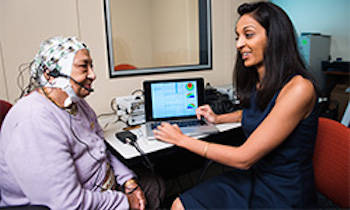
Indian American scientist & professor Sona Patel, Ph.D. of Seton Hall’s School of Health and Medical Sciences is conducting a new research that could one day make early detection of Alzheimer’s disease, Parkinson’s disease and other degenerative brain diseases as easy and inexpensive as using a smartphone app.
The assistant professor of speech-language pathology is looking at errors in various speech tasks to search for voice clues in the early onset of the diseases.
Funded by a three-year, $380,000 grant from the National Institute of Deafness and Communicative Disorders (NIDCD), Patel’s research looks at how people react when their auditory feedback is changed while they speak. The study combines brain activity analysis using electroencephalogram (EEG) testing with altered auditory feedback to detect differences in brain activity and vocal responses between people with normally aging brains and those with early cognitive impairment due to Alzheimer’s, Parkinson’s and other degenerative brain diseases.
“We connect the research participants to an EEG system and a microphone and ask them to say a vowel sound while they listen to themselves through headphones,” said Patel. “They are asked to maintain a steady sound, but we make it tricky by changing the auditory feedback (the sound they hear) slightly, such as pitch or loudness, and measure their neural and voice responses.” Preliminary findings, in collaboration with Northwestern University, show differences between people with Parkinson’s disease and healthy individuals in how they react to changes in real-time auditory feedback.
Having previously worked exclusively with Parkinson’s patients, Patel is now expanding her research to include patients with Alzheimer’s disease, mild cognitive impairment, and even those with trouble remembering things. She is currently seeking men and women, 50 years of age and older, to take part in the research and is collaborating with Hackensack University Medical Center and the Kessler Institute for Rehabilitation, among others.
Patel is hopeful her research will lead to an easy-to-access and inexpensive diagnostic tool that can be used to detect cognitive decline in the early stages. In addition, she hopes that this tool can be used throughout the world, including in less developed nations where patients with neurological diseases often go undiagnosed and untreated.
“What I would envision is to put this software on an app that can be used by the patient directly or in a medical facility,” said Patel. “A patient or doctor could do a quick test with a vocal recording, and the score would indicate the likelihood of a neurological problem. If patients can be diagnosed in an early stage of disease, treatment and drug therapies can start at that time, possibly slowing the disease progression.”
Patel expects to have the results from her neuro-behavioral modeling research in the fall of 2016. At that point, Patel and her growing team of four graduate and undergraduate research assistants at the Voice Analytics and Neuropsychology Lab on Seton Hall’s South Orange, N.J. campus will look for ways to apply the research in practical and clinical settings.





Be the first to comment